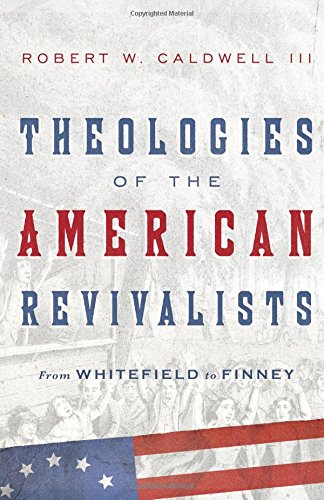Theologies of the American Revivalists is a historical theological look at the fascinating story of
American revival theology between 1740 and 1840. In the book, Robert W. Caldwell III considers the
theologies of the important figures and movements of the period, tracing the developments and
disagreements of revivalist thinking in one insightful narrative that also challenges our
understanding of Christian conversion toady. In the following interview, Caldwell expands on the
topic of his book and the thinking behind this unique angle on the First and Second Great
Awakenings.
What drew you to write a book on the topic of American revival theologies during the
Great Awakenings?
Robert W. Caldwell III: Ever since my seminary days, I have been fascinated at the interplay
between theology and Christian experience or spirituality, most specifically related to
Christian conversion. As a scholar working on the First and Second Great Awakenings, I
found that many revivalists had a well-developed theology that combined soteriology
(doctrine of salvation) with insights related to both how Christian conversion is supposed to
be experienced and how the gospel is to be proclaimed. I found that from 1740 to 1840 there
was a rich genre of literature that combined these three elements, which collectively I call
“revival theology.”
What makes your book distinctive among others that consider the history of theology in
America?
Caldwell: Theologies of the American Revivalists argues that American revivalists from the First
and Second Great Awakenings (1740–1840) thought, preached, and wrote extensively on
what I call “revival theology,” which I define as the three-fold combination of Protestant
soteriology, conversion expectations, and preaching practices during a revival. There have
been other works that examined the individual pieces of this study (history of American
theology, studies on revival, conversion, and preaching), but to my knowledge no work has
tried to unite these in one historical theological narrative. The book identifies, explores, and
charts the historical theological developments of the various different schools of revival
theology of the period, with specific attention given to the major controversies and writers in
that century.
What are some of the different schools of revival that you consider in the book?
Caldwell: The book notes how the original Pietistic Calvinism of First Great Awakening
Puritanism divided out into Reformed, Edwardsean, Arminian, and Radical streams. It also
highlights forgotten schools of revival theology. Today, many evangelicals associate revivals with Arminianism and/or Pentecostalism, and some think of it as a Pelagian method for
mass evangelism. My book counters this assumption and significantly expands it by
exploring the forgotten schools of revival theology from a period when serious evangelical
theologians and revivalists wrote on the topic—including the Edwardsean theological
tradition, the Radical revival tradition, and the Biblicist antiemotional tradition of the
Campbellites.
What do you hope readers will take away from this book?
Caldwell: The evangelical church today has not given much theological reflection on the
nature of Christian conversion and revival. Much of our understanding of these topics is
practically oriented and often pretheological. In this book, I desire to present the various
stories of our evangelical forefathers who wrote deeply theological sermons and treatises on
revival theology. My hope is that evangelicals today will be both informed and challenged
by the various schools of thought presented in the book.
Endorsements:
Mark Noll, author of The Rise of Evangelicalism:
“Revival—or even more, the longing for revival—has been central throughout American
Christian history. But what is meant by revival? Robert Caldwell’s well-researched and
exceedingly evenhanded book explains clearly what leaders of the American First and
Second Great Awakenings taught concerning conversion, free will, the Holy Spirit, and how
to interpret Scripture. He also explores with rare sensitivity what they assumed in their
revival theologies. The result is a book rich in historical insight but also practical in guiding
believers today in thinking about this vitally important matter.”
Joel R. Beeke, president, Puritan Reformed Theological Seminary, Grand Rapids:
“Robert Caldwell offers a sophisticated and thought-provoking analysis of revivalist
theology, rooted in the peculiarities of Jonathan Edwards’s Reformed and evangelical
theology, but developing and bearing fruit in ways that at times were flatly contradictory to
Reformed doctrine. Linking Finney to post-Edwardsean theologians like Hopkins,
Caldwell’s monograph will stimulate scholarly discussion on a topic important both for the
history of theology and the practice of the modern church.”
Thomas S. Kidd, distinguished professor of history, Baylor University:
“Robert W. Caldwell’s Theologies of the American Revivalists offers an illuminating and
authoritative review of how leading American revivalists, from Jonathan Edwards to
Charles Finney, grappled with issues such as the nature of gospel preaching, conversion, and sanctification. I recommend it highly.”
Mark Dever, pastor of Capitol Hill Baptist Church, president of 9Marks.org:
“In this one volume, Robert Caldwell has carefully traced the fascinating story of revival
through an event-filled century of change. Dependent on primary sources and freshly locating figures from Fuller to Finney, this is important theology presented by an even-
handed guide.”
